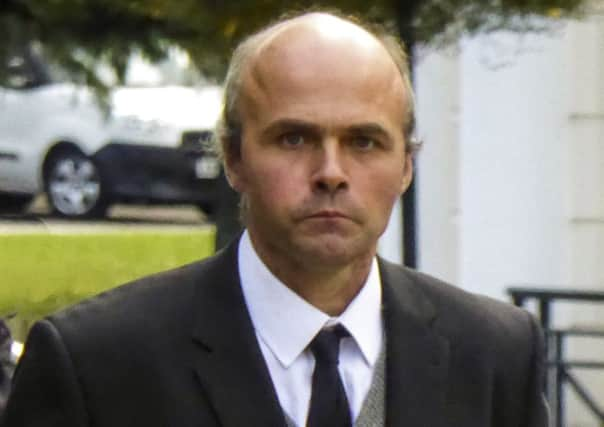More time given to Oxhill farmer after animal welfare offences


It had been said that the suffering caused to farmer David Letherbarrow’s animals in 2013 was not wilful or malicious, but that he was ‘simply incompetent’ at the time.
Letherbarrow, 51, of Springfield Farm in Oxhill, had been given a 24-week suspended prison sentence after pleading guilty to eight animal welfare offences and six breaches of various regulations.
Advertisement
Hide AdAdvertisement
Hide AdBut the magistrates had also disqualified him from owning or keeping animals for five years – and it was against that which he launched an appeal at Warwick Crown Court.
It was heard in September when Judge Sylvia de Bertodano, sitting with two magistrates, gave him six months to show he could run the farm as it should be run.
The judge indicated: “If it is all in order six months from now, then we will not take away his livelihood.”
And at the resumed hearing prosecutor Kevin Saunders said that animal welfare inspectors had formed the view that the farm was now in a satisfactory state.
Advertisement
Hide AdAdvertisement
Hide Ad“He has been able to maintain the farm to a satisfactory standard over the last six months. We recognise there has been improvement, and we also recognise the particular circumstances in which the offending took place.”
So Judge de Bertodano said the appeal against the disqualification from keeping animals would be allowed, telling Letherbarrow: “You will be pleased this is finished.”
During the original hearing his barrister Sam Skinner had said the ban would take his livelihood from him and prevent him running the farm which had been in his family for generations.
Mr Saunders, prosecuting for Warwickshire County Council, said the case began with visits to Springfield Farm by trading standards officers in November 2012 and February 2013.
Advertisement
Hide AdAdvertisement
Hide Ad“He was given advice regarding the welfare of livestock. An aggravating feature is a sheer inability to respond.
“But the suffering that was caused to his livestock it is not submitted was wilful or malicious. The consideration is that he is simply incompetent.”
Mr Saunders said the first four offences related to a failure to register the deaths of bovines with the British Cattle Movement Service on four dates between January and April 2013.
“It is important that births and deaths are reported promptly. Cattle traceability underpins all systems of disease control and thus safeguards the food chain.”
Advertisement
Hide AdAdvertisement
Hide AdThe investigations into the farm had started when trading standards officer Zoe Putnam collated ‘fallen stock receipts’ from the Warwickshire Hunt kennels showing it had received a number of carcasses from the farm over the previous weeks – but cross-checks showed the deaths had not been reported within the time limits.
Other offences, charged under the Animal Welfare Act, came to light when the cattle sheds were inspected in March and April 2013, and included cattle up to their hocks in muck and a failure to provide a lying area with well-maintained dry bedding.
“He was served with an improvement notice on the first visit, but failed to comply with it. Officers attend again on the 3rd of April, and the situation is much the same.”
But Mr Saunders added: “Since this conviction there have been efforts to improve matters, and there is now a provision of dry bedding and the depth of the muck has decreased.
Advertisement
Hide AdAdvertisement
Hide AdMr Skinner had conceded: “I agree these are serious offences, and at the time they were committed David Letherbarrow was not able to cope with running Springfield Farm.
“The photographs are nasty and the video films are nasty. I agree at the time he was not competent to run that farm. But there was nothing wilful and nothing deliberate in his behaviour.
“The basis of my appeal is that you do not prevent him from farming in the future.”
Mr Skinner said the 120 owned acres of the farm, which had a further 200 acres of rented fields, had been farmed by the family for generations and had been run properly by Letherbarrow’s father, with him as ‘a perfectly competent number two.’
Advertisement
Hide AdAdvertisement
Hide AdBut Letherbarrow, who had known nothing but his parents and the farm for all his working life, was badly affected by his mother’s death in 2008, particularly because his farm duties had prevented him visiting her in hospital on the day before she died.
So after his father suffered a stroke in 2013 and had to spend many weeks in hospital, around the time of the offences, ‘he prioritised going to see his father every day because he feared the same thing would happen.’
To make matters worse, that coincided with ‘one of the worst winters in living memory’ which meant cattle had to remain inside for a longer period.
“At that time he had mentally switched off; and in farming, if you switch off, things go bad very quickly.”
Advertisement
Hide AdAdvertisement
Hide AdMr Skinner pointed out there had been no repeat of what happened in 2013, and Letherbarrow, whose father was now at home but in a wheelchair, has drastically reduced the number of animals to enable him to cope better with running the farm alone.
“Having farmed at this farm his whole life, and his family for generations, the disqualification order means they can no longer farm. He knows no other life. I ask you to allow him another chance to keep farming.”